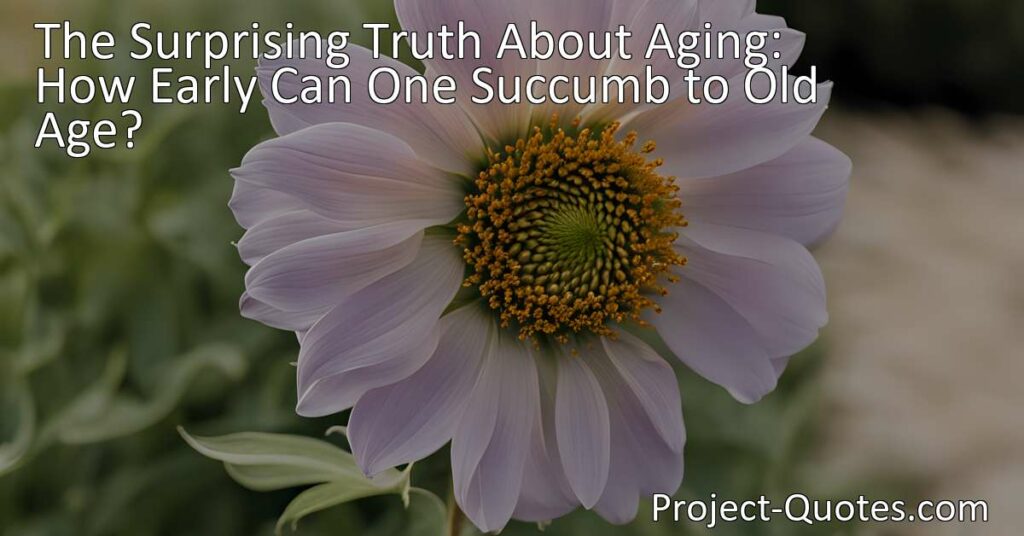How young can you die of old age?
Steven Wright
Discover the surprising reality behind aging – it’s not just about the number of years lived. Old age is characterized by physical and mental decline that can happen at any age. Factors such as genetics and lifestyle choices play a crucial role in determining the speed of aging. Understanding the diverse experiences of old age and taking care of our well-being can promote healthy aging for all.
Table of Contents
Meaning of Quote – How young can you die of old age?
How young can you die of old age? It may seem like a curious paradox, but the truth is that “old age” is not really about the number of years one has lived, but rather about the physical and mental decline that often accompanies aging. While it may be more common for older adults to experience the effects of aging, it is not unheard of for young individuals to face premature aging and its associated challenges.
Old age is generally characterized by a gradual decline in physical abilities, such as strength, flexibility, and mobility. Mental faculties, including memory and cognitive functions, can also be affected. These changes are a natural part of the aging process and are typically influenced by a combination of genetic, lifestyle, and environmental factors.
However, it is important to note that not everyone ages at the same rate. While some individuals may experience significant physical and cognitive decline in their 70s or 80s, others may remain remarkably healthy and active well into their 90s or even 100s. On the other hand, there are cases where people face premature aging, which causes them to exhibit signs of old age at a much younger age.
Premature aging, also known as early-onset aging, can be caused by various factors, both intrinsic and extrinsic. Genetic disorders like Werner syndrome, progeria, and Hutchinson-Gilford progeria syndrome are rare conditions that accelerate the aging process. These disorders affect multiple systems in the body, leading to physical changes associated with old age at a significantly younger age. However, it’s crucial to understand that these conditions are exceptions rather than the norm.
In contrast, extrinsic factors play a larger role in premature aging experienced by most individuals. Lifestyle choices and environmental influences can greatly impact the rate at which a person ages. Factors such as smoking, excessive alcohol consumption, poor nutrition, lack of exercise, exposure to chronic stress, and prolonged sun exposure can all contribute to accelerated aging.
Smoking, for example, is known to cause premature wrinkling and skin damage. This is because tobacco smoke contains harmful chemicals that reduce blood flow to the skin and deplete collagen, a protein responsible for maintaining skin elasticity. Similarly, excessive alcohol consumption can lead to liver damage and inflammation, which can contribute to premature aging.
Poor nutrition is another significant factor that affects the aging process. A diet lacking in essential nutrients, such as vitamins, minerals, and antioxidants, can weaken the immune system, impair cellular functions, and increase the risk of chronic diseases. These factors not only compromise overall health but can also accelerate the aging of various organ systems.
Additionally, chronic stress has been shown to have detrimental effects on both physical and mental well-being. Prolonged exposure to stress hormones, such as cortisol, can lead to inflammation, oxidative stress, and cellular damage, ultimately accelerating the aging process. Stress management techniques, such as exercise, meditation, and social support, are important for mitigating these effects and promoting healthy aging.
While it is true that old age is often associated with accumulated years, it is equally important to recognize that age is not solely determined by the number of candles on a birthday cake. The way we take care of our bodies and minds plays a critical role in how gracefully we age. By making healthy lifestyle choices, such as exercising regularly, eating a balanced diet, avoiding harmful habits, and managing stress effectively, we can potentially slow down the aging process and enjoy a more vibrant and fulfilling life.
Furthermore, it is essential to cultivate an age-positive mindset and challenge societal stereotypes surrounding old age. Just because someone is younger than what is typically considered “old” by societal standards does not mean they cannot experience the challenges associated with aging. Understanding and empathy toward those who face premature aging is crucial, as it is not just a matter of appearances but also impacts their overall well-being and quality of life.
In conclusion, the phrase “old age” is not solely defined by a specific number on a calendar but rather by the physical and mental changes that accompany the aging process. While it is more common for older individuals to experience these changes, premature aging can affect younger individuals due to genetic conditions or extrinsic factors such as lifestyle choices and environmental influences. By taking proactive steps to prioritize our well-being and challenging societal notions of age, we can promote healthy aging and a more inclusive understanding of the diverse experiences related to old age.
Freely Shareable Quote Image
I hope this quote inspired image brings you hope and peace. Share it with someone who needs it today!


